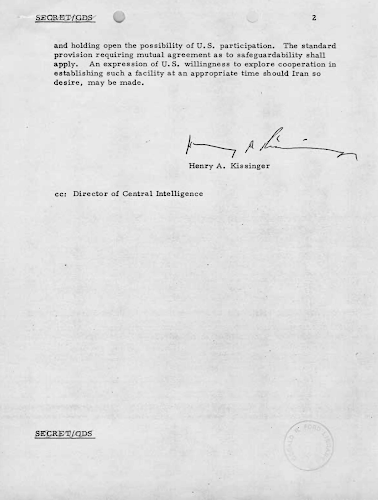As I have posted in the past, there is a great deal more to Iran's nuclear ambitions than Washington would have us believe. In the past, I have posting this article which looks at the connections between the United States and Iran's nuclear program going back to the Eisenhower Administration. In this brief posting, we will take a look at more recent history which clearly shows Washington's complicity in the nuclearization of Iran.
Let's open with this document, a signed copy of the formerly "Secret" National Security Decision Memorandum 292 dated April 22, 1975 (during the Gerald Ford Administration and when the Star of Iran was still in power):
Note that, under NSDM 292, the Ford Administration was more than willing to let Iran process radioactive materials and sell the output to nations with which the United States had "Agreements".
In a memorandum regarding the Nuclear Agreement with Iran from the President's Assistant for National Security Affairs, Brent Scowcroft, dated January 26, 1976, we find the following on the Office of the Historian for the Department of State :
"The US has run into a serious impasse in its negotiations for a nuclear agreement with Iran. The agreement was to serve as the enabling vehicle for our supplying Iran with approximately 6 to 8 large nuclear power plants and the associated enriched uranium fuel, and for possible Iranian investment in the next US gaseous diffusion uranium enrichment plant.
Our basic position for these negotiations was set forth in NSDM 292 (Tab D).2 Consistent with those guidelines, which were intended to strengthen our nuclear safeguards, we have been seeking the right to approve where the US supplied fuel can be reprocessed and the resulting weapons-usable plutonium retained. Our objective is to preclude reprocessing and storage in wholly national facilities. We have, however, assured the government of Iran that we would permit our fuels to be reprocessed in Iran on a suitable multinational basis.
In the past, Iran also has expressed an interest in contributing up to 20% of the cost of the next, privately built US gaseous diffusion plant. Iran would then be entitled to receive 20% of the output of the plant. We have informed Iran that we would permit it to physically receive such amounts of this material as are necessary for its own reactors and for pass-through fabrication for use in third countries with whom we have agreements. The remainder of Iran’s proposed share of the output, which would be in excess of such needs, would be stored in the US until actually needed in Iran or in a third country acquiring its fuel through Iran." (my bolds)
One of the issues with the nuclear deal was that France was willing to supply nuclear reactors to Iran with less rigorous safeguards than proposed by the United States, an issue that had shaken the Shah of Iran's confidence in the special relationship that Iran share with the United States. At that time, the Department of State felt that the Shah was becoming increasingly concerned about the efforts by both India and Pakistan to develop nuclear weapons and the potential for his Arab State neighbours to develop their own nuclear weapons.
The American agencies involved in the negotiations agreed that:
"1.) We (the United States) should allow Iran to receive and store all enriched uranium to which it might be entitled by reason of an investment in US private enrichment firms (UEA or prospective centrifuge enrichment companies), as long as any retransfer is to countries with which the US has an appropriate agreement for cooperation. (This step should improve the outlook for Iran’s investment in private US ventures, which will increase the chances that they can get off the ground and make private enrichment a reality.)
2.) We (the United States) should determine that Iran still has a serious interest in acquiring US nuclear equipment and material, and that our negotiation is not just an exercise." (my bold)
Now, let's look at National Security Decision Memorandum 324 dated April 20, 1976:
In this document, it is very clear that Washington wanted Iran to pursue the multinational aspect of the nuclear fuel reprocessing business, even to the point of offering Pakistan a stake in the processing facility. In the mid-1970s, it was clear that Pakistan was embarking on a path that would lead to the development of nuclear weapons, a goal that was achieved in May 1998 in violation of the Nuclear Nonproliferation Treaty.
Washington's past dealings with the Shah of Iran led directly to the current nuclear capabilities that Iran has achieved. Not only did the United States supply Iran with the radioactive material necessary to start its program, out of sheer greed, it wanted to profit from the agreement by having Iran to sell its nuclear products to nations with which Washington had an "Agreement". Unfortunately, the 1979 coup that ousted the Shah of Iran and brought Ayatollah Khomeini into power put a quick end to Washington's plans for a friendly and profitable nuclear Iran.









No longer US's sons of bitches, eh!?
ReplyDeleteWhen it comes to Iran's official stance towards America anyone saying that Iran has good reason not to trust the American government is making an understatement. America through its foreign policy has reeked havoc upon many countries, but few societies have been affected or suffered from our meddling as much as Iran. The article below delves into this subject.
ReplyDeletehttp://brucewilds.blogspot.com/2017/07/iran-and-reason-for-its-deep-distrust.html